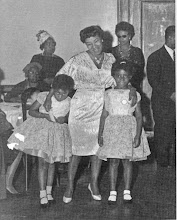Willi Posey was born in Palatka, Florida in 1903. She describes it as a very small town in which there was little formal segregation, or so it seemed to her from the perspective of her early childhood through adolescence when she moved to New York to join her sister Bessie and her husband Henry in Harlem.
In the series of autobiographical texts I have from my grandmother (two interviews in 1978 and 1980 respectively, and an autobiographical essay 19 pages in length), some of her most fascinating observations and remarks are made concerning this place of her birth and early upbringing. She describes in detail her memories of the day in 1912 when her father, B.B. Posey, died of appendicitis. She was fascinated by her most visual memory in which the doctor arriving at her house in a horse-drawn carriage with the dirt in the road flying up in the air around the hoofs of the galloping horse. Her sister Inez (who would have been about 16) was taking her for a walk, she tells me. Her memories of this day, as well as the events that preceded and followed it, are highly elliptical and fragmentary. That she couldn't tell me when he died or how old she was (her guess that she was about 6) made it difficult at the time to imagine what it was like for her. But now that I know she was nine, it is perhaps a coincidence that I, too, had a harrowing experience with death at the same age when I was travelling in Italy with my grandmother, Mom and my sister, and we received the news that Uncle Andrew was dead.
So I can compare MJ's memories to my own in terms of fullness and/or precision. I can remember a lot of things about being nine, and before I was nine, very clearly. For instance, I can remember the day we received the call at the hotel in Rome. But at the same time, there are other things which are totally blank, such as the content of conversations that my mother and my grandmother had. I don't think I can remember anything MJ ever said to me during that trip although I shared a room with her, and my sister shared a room with Mom.
MJ can remember little of a personal and intimate nature about her father. She was nine when he died although I wouldn't have known that when I was interviewing her in the late 70s and the early 80s because she was most insistent that I not mention her age in anything I might write about the family.
But she needn't have worried about that then since I was so completely disoriented by her description of her life in Florida. In particular, her total lack of a sense of hardship, either racial or economic, came as a complete surprise to me, given the literature that then provided my understanding of her historical period. When I interviewed her, I had no knowledge whatsoever of this period of history, the turn-of-the-century, which has become my favorite. For black people in particular these were difficult times, especially in the South where the largest number of blacks were congregated. My sense of this difficulty was only in the vaguest terms and based upon the generalizations that most people my age took for granted, which was the Civil Rights Movement was the most important thing to happen for black people in the South since the Civil War.
I knew there was a Reconstruction period but I had not yet become a student of DuBois's Souls of Black Folk (1903) and his cogent historical account of how black people had fared since the Emancipation Proclamation. DuBois work had endured a kind of blacklisting and neither he nor his writings were back in fashion yet. When I did finally begin to read Souls a few years later while I was teaching at the University of Oklahoma, I found the language and the assumptions nearly inpenetrable, mostly again, I think because I had had so little previous exposure of how black folks got from 1865 to 1965.
So the period my grandmother was born in was closed to me, especially the part having to do with the South. The furthest South I had ever been at that point was Washington D.C. when I attended Howard University or one semester in 1969. Then I had taken a short trip to Tupelo Mississippi to do a story for Rolling Stone about a supposed resurgence of the Civil Rights Movement in 1980. They cancelled the assignment before I could begin to write it.



